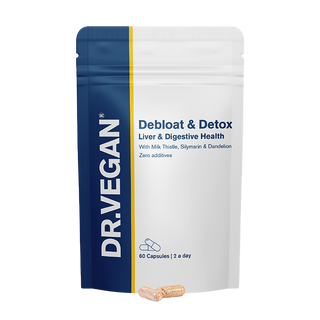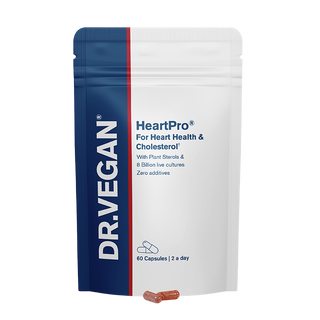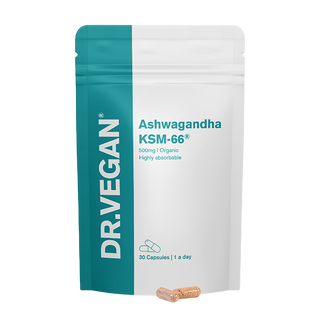Warning signs of a heart attack

Heart disease and heart failure isn't just an issue for men - it is the #1 cause of death among both men and women. In the UK, someone is hospitalised with a heart attack every five minutes, and more than 900,000 people in the UK are living with heart failure. 1.4 million people alive in the UK today have survived a heart attack.
The heart is one of the most vital organs in our body, pumping blood throughout the body and delivering essential nutrients and oxygen to our organs and tissues. Expert nutritionist Isabelle Nunn (MPharm, Dip NT) shares the signs to look out for if you may be at risk of a heart attack, factors that impact heart health including bloating and snoring, and how to help prevent a heart attack.
Is your diet supporting your heart? Find out in your free Diet Profile.
What happens during a heart attack?
A heart attack occurs when blood flow to the heart is blocked, leading to damage or the death of heart tissue. Coronary heart disease (CHD) is the most common cause of heart attacks, and is where the coronary arteries supplying the heart become clogged with deposits of cholesterol. HeartPro® is a daily formula of clinically studied ingredients including plant-sterols for lowering cholesterol, probiotics and essential nutrients to protect and support your heart health every day. Discover HeartPro® today.
The warning signs of a heart attack can vary from person to person, and they can include:
- Chest pain or pressure that lasts for a few minutes, or comes and goes.
- Shortness of breath, with or without chest pain.
- Light-headedness, nausea or cold sweats.
- Pain or discomfort in different parts of the body. Women particularly can experience unexplained tiredness and jaw pain.
Some symptoms experienced by women can be confused with menopause symptoms, such as unexplained tiredness and aching joints. You may enjoy learning about the unusual symptoms of menopause and if you're going through menopause, it's important to remember that nutrition in the menopause is very important for heart health and in relieving symptoms of menopause.
If you experience any of these symptoms, call the emergency services immediately. The sooner you access treatment, the greater the chances of reducing damage to the heart muscle.
Complications associated with heart attacks
Heart attacks can weaken the heart, causing the heart muscle to lose its ability to pump blood around the body and nourish the cells in your body. The result is heart failure.
With a weakened heart, blood backs-up and fluid may build up in the lungs, causing shortness of breath. Legs, ankles and feet can swell, and bloating in the abdomen may occur.
Bloating and heart health
Bloating is a common digestive issue that affects 70% of people, causing discomfort, poor sleep and low mood. Although several factors can cause bloating including overeating, stress, and food intolerances, bloating can also be a sign of a weak heart. If bloating is persistent or getting worse, see your GP to rule out more serious conditions such as IBS or a heightened risk of heart failure.
Debloat & Detox

You may enjoy reading our practical tips to reduce bloating, which includes adding fennel to your diet, in your tea, or adding fennel seeds to your meals to help help relieve symptoms of bloating.
Fennel seeds can also be found in our plant-based formula Debloat & Detox. 80% of customers who take Debloat & Detox feel the difference within 4 weeks.*
Snoring puts a strain on the heart
Snoring may seem harmless, but it can also be a sign of 'Sleep Apnoea' – a sleep disorder affecting 20% of adults, with chronic and loud breathing that repeatedly starts and stops. Sleep Apnoea can cause regular waking and gasping for air, in the middle of the night. If you suffer poor sleep you're not alone - in a customer survey of over 12,000 men and women, just 4% of people say they have no issues sleeping.
Regular interrupted sleep causes a surge in our stress hormones, cortisol and adrenaline, which puts a strain on the heart. If left untreated, Sleep Apnoea can lead to heart failure, high blood pressure or a heart attack. Learn more in 'What is cortisol' and 'How adrenal glands affect stress'.
Addressing risk factors that contribute to sleep apnoea are a good starting point, such as cutting out smoking and exercising to maintain a healthy weight.
Tips to help prevent a heart attack
There are three important you can do to support a healthy heart.
Have a heart health check
Having a heart health check can help provide a good benchmark and guide you on where the focus should be on to improve your heart health. It is important to keep your cholesterol in check and manage your blood pressure to reduce strain on the heart.
Focus on diet
Nutrition and your diet play a vitally important role in your heart health, so focus on a heart-healthy eating plan, which can also be referred to as the ‘cardiac diet’. Learn more in 'A nutritionist's food guide for a healthy heart'.
Essential fatty acids are important for heart health. If you eat fish, you can gain Omega 3 from consuming at least 2-3 portions of oily fish a week, and if you do not eat fish, you may wish to consider supplementing with a Vegan Omega 3. Our Omega 3 is from algae and provides the optimal dosage of 300mg DHA and 150mg EPA per serving. Learn more about Omega 3 fatty acids or watch how to find a good Omega 3 supplement.
Manage stress and your sleep routine
Looking after your heart also entails managing stress and aiming for good quality sleep, by creating a good sleep routine and environment. Just 4% of people say they're stress-free, while 47% of us say we regularly suffer high or overwhelming stress.
Magnesium plays an important role in over 300 bodily functions, including stress and sleep. Magnesium can be found in almonds, dark green leafy vegetables, and fruits such as dried apricots, bananas, and avocados. If you're unsure if you have enough Magnesium in your diet, we recommend reading 'How do I know if I'm deficient in Magnesium?'.
You may wish to consider a Magnesium supplement on its own, or within a combination of other nutrients in the acclaimed formula Vegan Nights® .
We think you'll also enjoy reading:
- Adaptogens that can change your life
- Foods to help boost energy and reduce stress
- A nutritionist's food guide for a healthy heart
*Based on a UK survey conducted by DR.VEGAN® of 251 customers, nationally representative, during August & September 2022. All research findings reflect our own research efforts and have not been influenced or verified by any external organisations or third-party entities.
Want to hear more from our nutritionists? Sign up to our free newsletter:
References
How to beat bloating: the research
Sleep apnoea - NHS (www.nhs.uk)
Kline, L. R. (2022, June 1). Clinical presentation and diagnosis of obstructive sleep apnea in adults. In N. Collop (Ed.). Clinical presentation and diagnosis of obstructive sleep apnea in adults - UpToDate
https://www.uptodate.com/contents/clinical-presentation-and-diagnosis-of-obstructive-sleep-apnea-in-adults
Magnesium supplementation improves indicators of low magnesium status and inflammatory stress in adults older than 51 years with poor quality sleep - PubMed (nih.gov)
Calculate your heart age - NHS (www.nhs.uk)



















